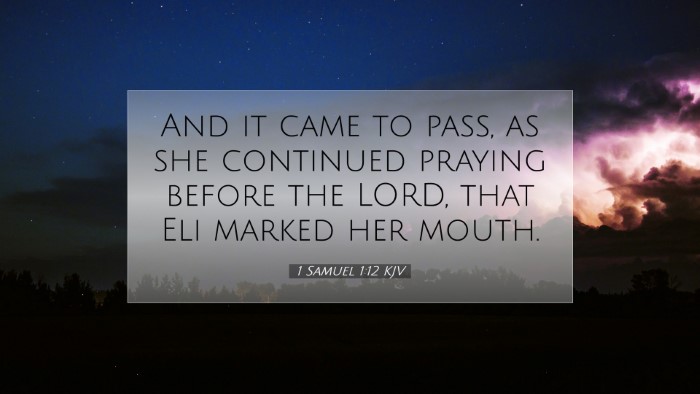Commentary on 1 Samuel 1:12
In 1 Samuel 1:12, we witness a poignant moment in the narrative of Hannah, the mother of Samuel, who becomes a pivotal figure in Israel's history. This verse states:
"And it came to pass, as she continued praying before the Lord, that Eli marked her mouth."
Contextual Overview
This episode occurs within the broader context of Israel's spiritual decline, marked by the corrupt practices of the priesthood, particularly that of Eli's sons. Hannah’s fervent prayer for a child is emblematic of her deep distress and desire for divine intervention.
Insights from Matthew Henry
Spiritual Perseverance: Matthew Henry notes that Hannah's continued prayer reflects her unyielding faith and desperation. Her prayer is not a mere formality but a heartfelt cry to God, illustrating the depth of her anguish and devotion.
Inner Conflict: Henry emphasizes the significance of Hannah's silent interaction with God. Her lips moved, yet her voice was not heard, suggesting a profound inner turmoil and the intensity of her supplication, which resonates with those who feel unheard in their spiritual struggles.
Reflections from Albert Barnes
Divine Attention: Albert Barnes highlights the responsiveness of God to the earnest prayers of His people. In this act of prayer, Hannah exemplifies the principle that sincere supplication invites divine observation. Barnes notes that Eli, as a priest, inadvertently plays a role in recognizing Hannah’s state, reflecting how God can use various means to acknowledge the pleas of His followers.
Practice of Prayer: Barnes further expounds on the importance of persistent prayer, paralleling Hannah's agony with the struggles faced by believers. He suggests that true prayer can be fervent without the need for eloquence, affirming that God understands the intent of the heart.
Perspectives from Adam Clarke
Importance of the Priesthood: Adam Clarke focuses on Eli's role in this narrative, illustrating the function of the priest in mediating between God and man. His misunderstanding of Hannah’s silent prayer signifies the spiritual blindness prevalent in Israel, yet it serves to underscore the gravity of Hannah’s situation.
Symbolism of Prayer: Clarke points out that Hannah’s posture and actions in prayer symbolize the urgency and sincerity with which she approaches God. The act of praying with such intensity draws attention not only to her need but also establishes a model for believers who may find themselves in similar situations of despair.
Theological Implications
This verse showcases several theological themes:
- Faith in Adversity: Hannah's tenacity in prayer serves as a vital lesson in maintaining faith during trials. Pastors and theologians can draw from this to encourage congregants about the power of persistent prayer.
- God’s Sovereignty: The unfolding events ultimately display God's sovereignty in answering prayer and orchestrating circumstances. This underscores the belief that God is intricately involved in the lives of His people, even in moments of silence and waiting.
- Role of Intercessors: Eli's later recognition of Hannah's state signifies the importance of intercessors in the spiritual life. Leaders and scholars can reflect on the responsibility clergy hold in discerning the needs of their congregants.
Practical Applications
The insights gained from 1 Samuel 1:12 prompt several practical applications:
- Encouragement for Prayer: Church leaders should foster an environment where prayer is central, demonstrating that God hears the silent prayers of the heart.
- Compassion in Ministry: Like Eli, pastors should cultivate sensitivity to the struggles of those seeking God, emphasizing the need for compassion and understanding.
- Teach the Practice of Silence: Encourage believers to embrace moments of silence in prayer as a means of reflection and deepening their connection with God.
Conclusion
The moment captured in 1 Samuel 1:12 reveals the intricate interplay between human desperation and divine understanding. Hannah’s silent plea exemplifies profound faith amidst adversity. As spiritual leaders, students of Scripture, and theologians study this text, they find encouragement in Hannah's example and a reminder of the significance of earnest prayer.


